Japan’s spring season is well-known for its vibrant display of flowers, with cherry blossoms, or sakura, being the most commonly recognized. However, beyond cherry blossoms, Japan offers a plethora of stunning seasonal landscapes. Among these is the wisteria in Japan, which reaches its full splendor during this period.
Here are 28 of the best wisteria spots in Japan, along with various wisteria festivals to consider visiting this spring season. Keep in mind that event details such as pricing, access, and dates may vary, so it’s advisable to refer to their official websites for the most current information.
One of the best ways to explore Tokyo is to visit the local areas and immerse yourself in the local culture. If you want to explore local areas, we have created scavenger hunt adventures personalised to your interests, filled with fun facts, clues and puzzles. If you’re curious, you can check out the games here! Check out the Flip Japan Games here! |
Find out more about Spring in Japan here: What to do in Spring, Where to go in spring, Wisteria in Japan, Spring Date ideas, What to eat in spring, Where to see cherry blossom in Tokyo and Cherry blossom festivals.
1. Ashikaga Flower Park (Tochigi)
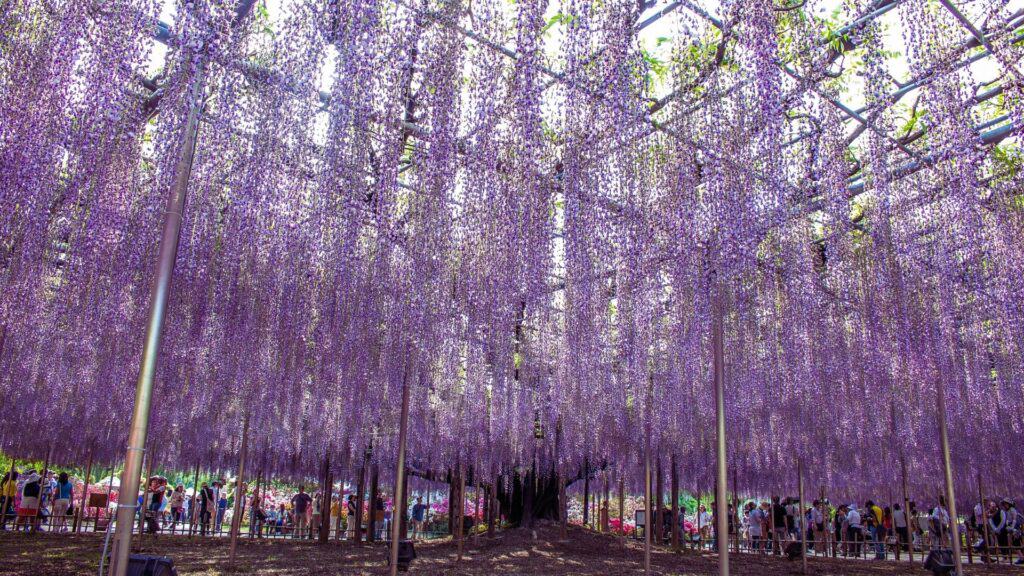
Ashikaga Flower Park was selected as one of CNN’s “10 Dream Travel Destinations in the World in 2014.” More than 350 wisteria in Japan bloom in spring, including the 150-year-old Ofuji, the Shirafuji tunnel, and the Kibana wisteria tunnel, which boasts a beautiful bright yellow color.
It is recommended to visit this place not only during the day but also at night, as it has been certified as a Japanese night view heritage site. The wisteria in the park blooms in the order of light red, purple, white, and yellow, and visitors can enjoy the changing colors for about a month.
Best time to see: Mid-April to mid-May
Access: About 3 minutes on foot from Ashikaga Flower Park Station
2. Kasama Inari Shrine (Ibaraki)
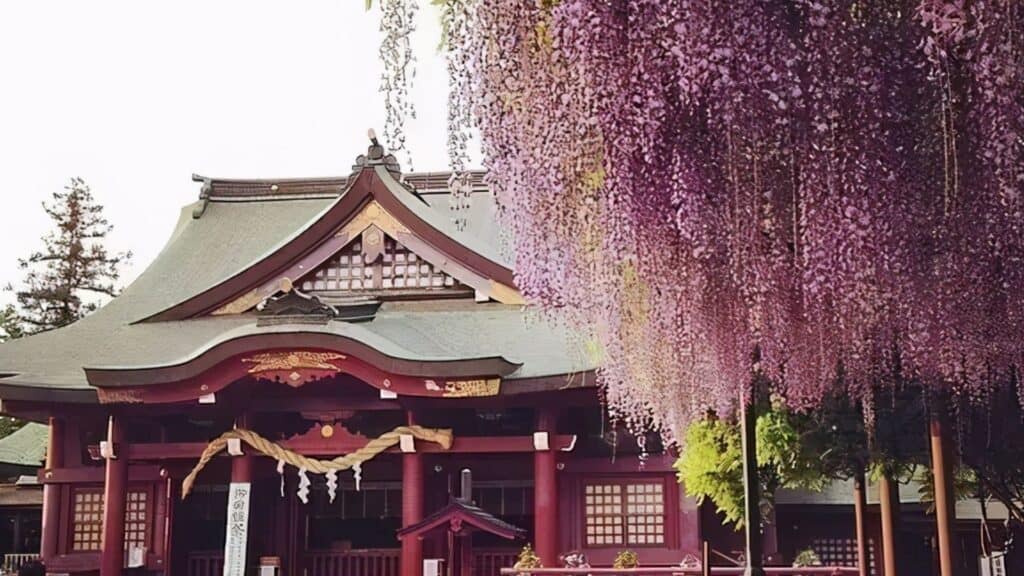
Kasama Inari Shrine is one of Japan’s three major Inari shrines, attracting approximately 3.5 million worshipers annually. The two wisteria trees within the precincts are over 400 years old and were designated as a natural monument of the prefecture in 1967. One of them is a slightly unusual type, where flowers gather and bloom like grapes. Additionally, the Kasama Inari Museum, showcasing ancient pottery from the six kilns of the Middle Ages, is located here.
Best time to see: Early to mid-May
Access: About a 20-minute walk or a 5-minute taxi ride from Kasama Station
3. Fuji no Sakuoka (Gunma)
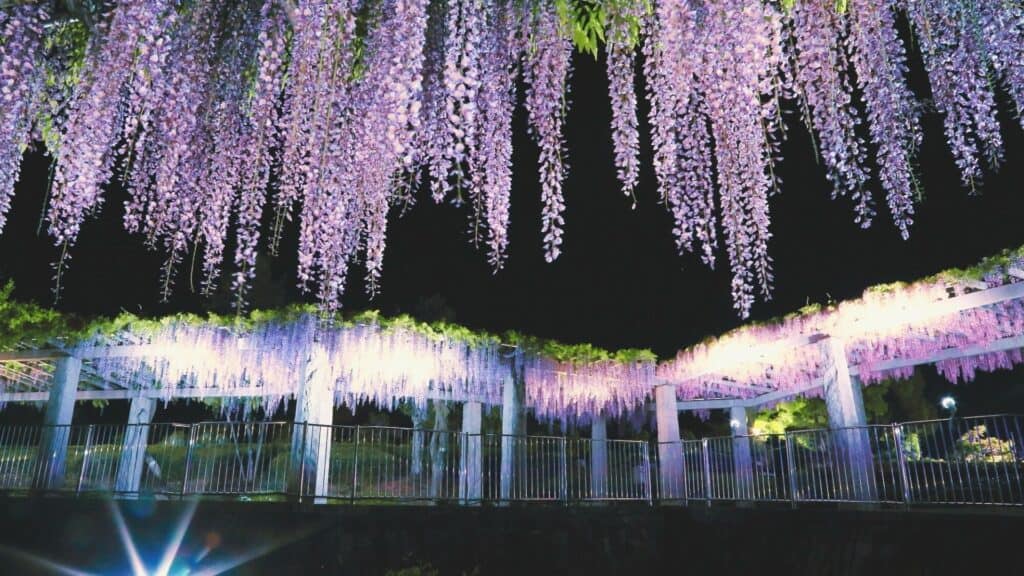
Colorful wisteria, including shades of purple, white, and pink, bloom beautifully in Fuji no Sakuoka, covering approximately 2.3 hectares. There is a wisteria shelf stretching about 250 meters in length and a garden featuring 45 varieties of wisteria.
The “Fujioka Fuji Festival” is held here, with the event theme changing according to the wisteria blooms. This festival hosts a local market, stalls, and outdoor concerts, attracting many visitors from across the country. The fantastic illuminations at night are also a must-see. Prior to the wisteria blooming, the “Fujioka Sakura Festival” takes place from late March to early April.
Best time to see: Late April to mid-May
Access: Approximately 15 minutes by city circulation (clockwise) from JR “Gunma Fujioka” station
4. Kameido Tenjin (Koto Ward, Tokyo)

More than 100 wisteria flowers bloom here from late April, attracting many visitors to the wisteria spots in downtown Tokyo for a quick view. During the wisteria festival, numerous stalls are set up, and the area is illuminated at night. The wisteria in Japan, which blooms beautifully against the backdrop of the Tokyo Sky Tree, offers a unique sight not found elsewhere.
The annual wisteria festival occurs each year when more than 50 wisteria flowers begin to bloom. Visitors can admire the flowers and the faint scent reflected in Shinji Pond, making it one of the most renowned wisteria spots in Tokyo.
Best time to see: Late April to early May
Access: Approximately a 15-minute walk from Kameido Station or Kinshicho Station
5. Kokuryo Shrine (Chofu City, Tokyo)

The wisteria at Kokuryo Shrine is called Sennen Noto. It is a sacred tree, estimated to be about 400 to 500 years old. When it is in full bloom, the lilac wisteria flowers adorn the wisteria shelf, standing about 4 meters high and covering approximately 400 square meters. Visitors are encouraged to admire the votive tablets and collect red stamps featuring beautiful wisteria motifs. During the wisteria festival, various stages and food stalls are set up, providing opportunities for participation and enjoyment.
Best time to see: Late April to early May
Access: Approximately a 5-minute walk from Fuda Station
6. Yokosuka Shobuen (Yokosuka, Kanagawa)
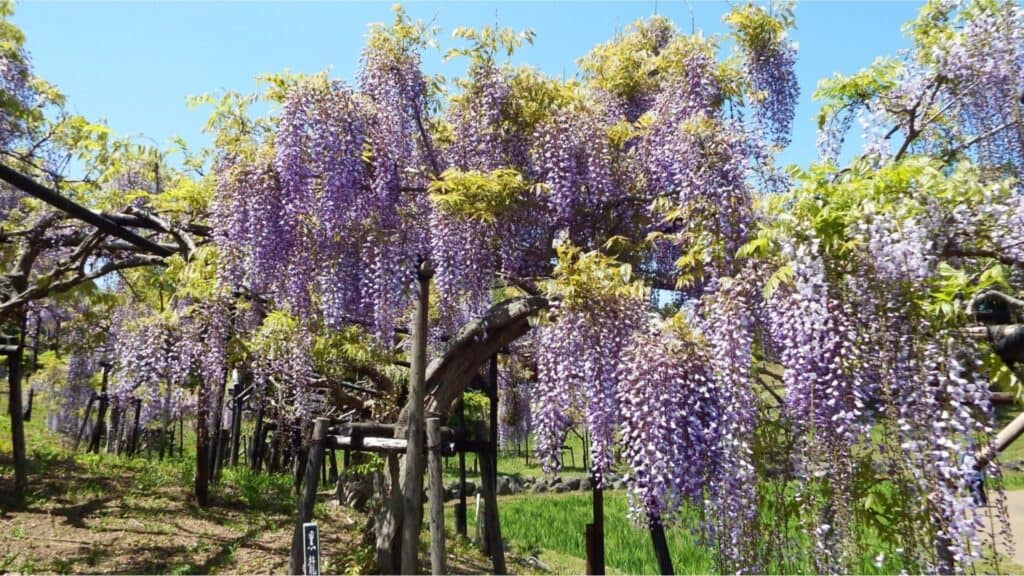
Yokosuka Shobuen, one of the largest spots for viewing wisteria in Japan, boasts around 250 wisteria trees of 11 different varieties. The wisteria festival takes place from late April to early May, where visitors can enjoy the sight of wisteria while savoring Japanese sweets and tea. In addition to wisteria, the park is also aglow with the full bloom of rhododendrons and Odemari, offering a variety of floral scenes and landscapes to enjoy.
Best time to see: Late April to early May
Access: From Kinugasa Station, get off at Keihin Kyuko Bus Iris Garden and walk for about 2 minutes
7. Tokaen (Saitama)
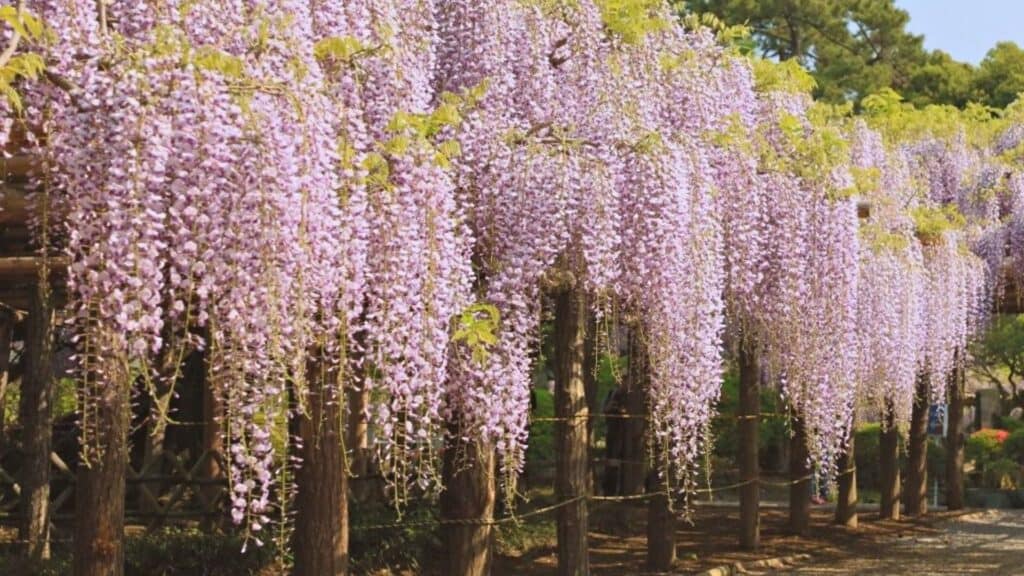
Tokaen features the wisteria, Ushijima no Fuji, which is over 1200 years old. This place is designated as a special natural monument. The branched branches spread over a wisteria shelf of about 700 square meters, along with the longest flower cluster that extends to 2 meters. There are other wisteria shelves of the same size scattered around, and you can enjoy watching irises and azaleas in the area of about 2 hectares.
Best time to see: Late April to early May
Access: About 10 minutes on foot from Fujino-Ushijima Station
8. Tamashiki Park (Saitama)
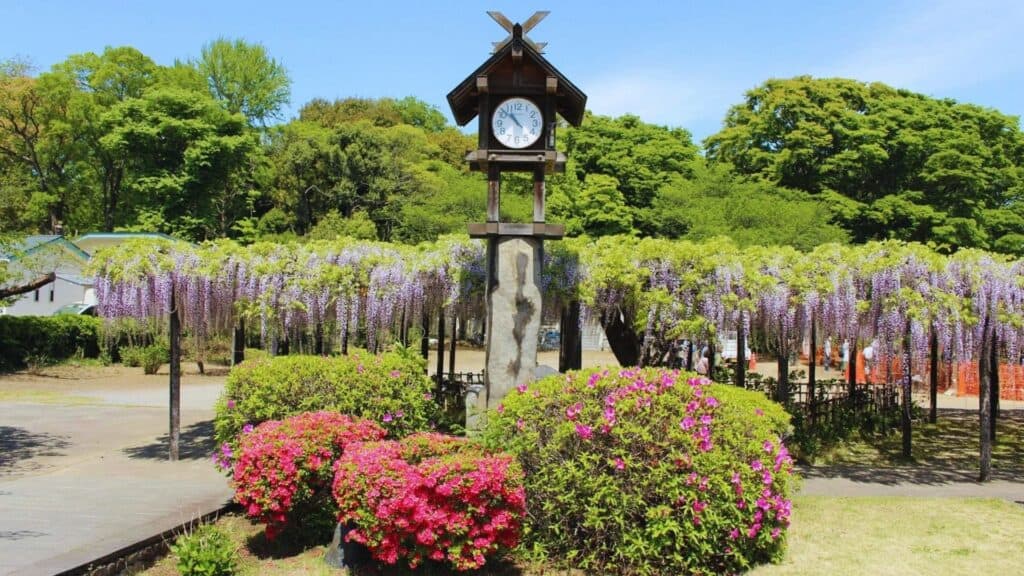
Tamashiki Park, known for its 450-year history, boasts a wisteria with flower clusters approximately 1 meter long and branches spreading over 700 square meters. This park in Saitama Prefecture is renowned for its wisteria and has been designated as a natural monument.
The Kisai Wisteria Festival, a highlight of the Golden Week, features a variety of events and performances, including Yosakoi dance and Japanese drums. Stalls set up during the festival attract tourists from across the country. The blooming of wisteria and azaleas creates a stunning display of colors, enhancing the beauty of wisteria in Japan. Just about 1 kilometre away lies Shiroyama Park, which also hosts a wisteria festival simultaneously. Visitors can enjoy exploring both locations during the blooming season.
Best time to see: Late April to mid-May
Access: Take the bus from “Kazo Station on the Tobu Isesaki line and get off at Kisai 1-chome stop, then walk for about 10 minutes
9. Chosenji Temple, Wisteria of Kotsuhada (Saitama)
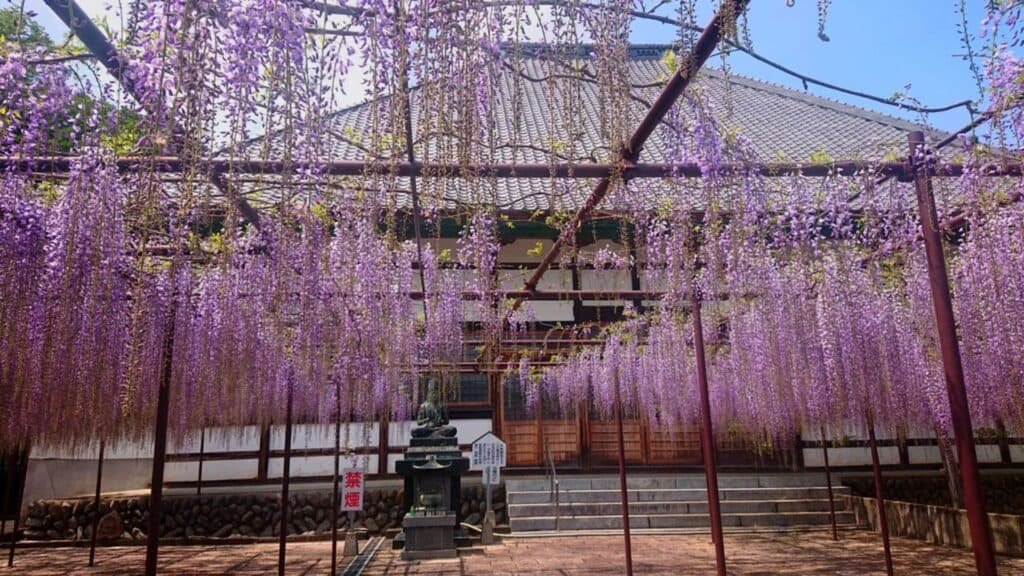
The wisteria at Chosenji Temple was designated a natural monument of the prefecture in 1959, and it is estimated to be about 650 years old. Spanning a total area of approximately 2,500 square metres, the site offers a stunning view of wisteria in four colours: white, pink, dark mauve, and pale mauve. During the full bloom, the area is illuminated for a limited period, providing a breathtaking spectacle of wisteria in Japan. This creates a unique opportunity to witness the ancient and vibrant beauty of these flowers.
Best time to see: Late April to mid-May
Access: About 7 minutes by taxi from Kodama Station
10. Mandaraji Park (Aichi)
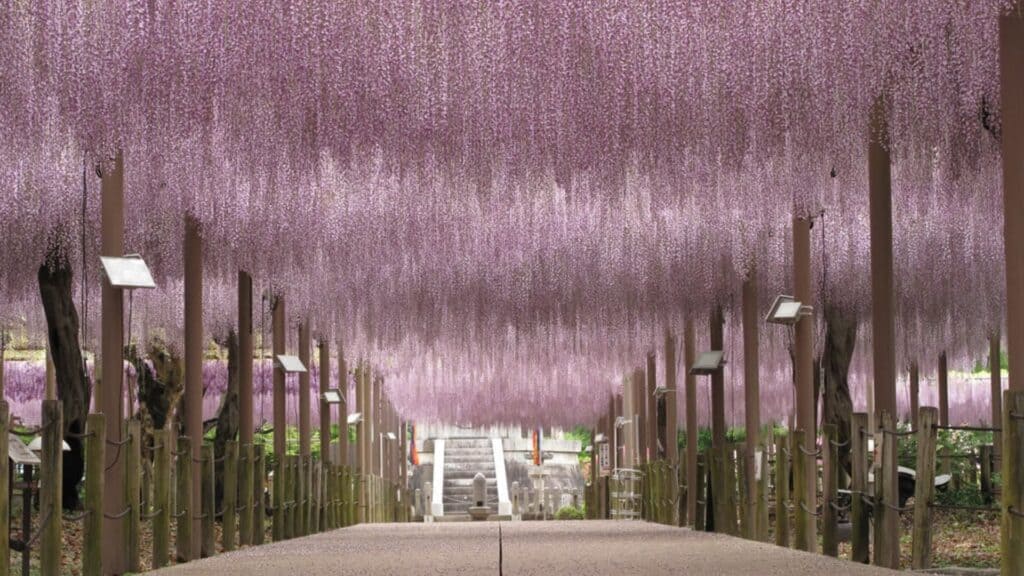
Mandaraji Park, adjacent to the renowned Mandaraji Temple built at the request of Emperor Go-Daigo, features approximately 60 wisterias of 12 varieties, including early and late bloomers in purple and white. The wisteria in Mandaraji Park reaches full bloom from late April to early May, during which time visitors can also admire around 300 peony flowers. The wisteria festival at the park is highlighted by fantastic illuminations and various events, offering a delightful experience of wisteria in Japan during this period.
Best time to see: Late April to early May
Access: About 10 minutes from Gangnam Station by Meitetsu Bus bound for Gangnam housing complex. Get off at Mandaraji Temple
11. Tennogawa Park (Aichi)

Tennogawa Park is located in Tsushima City in Aichi Prefecture is renowned for its wisteria, historically known as “Fujinami no Sato”. At Tennogawa Park, visitors can experience the enchanting wisteria flowers, reminiscent of the area’s heritage. The park boasts 114 wisteria trees of 12 varieties, centred around the notable nine shaku wisteria. With a wisteria shelf covering approximately 5,034 square metres, the site is illuminated both day and night, allowing for continuous enjoyment of the blossoms. The reflection of the wisteria trellis on the water surface adds a charming touch, offering a splendid view of wisteria in Japan.
Best time to see: Late April to early May
Access: About 15 minutes on foot from Tsushima Station
12. Hirotoen (Aichi)

Hirotoen, established around 1820, reflects the local inhabitants’ love for wisteria in Japan. They built wisteria shelves, leading to the cultivation of 14 wisteria trees known as Hiro no Nagafuji and one Daruma wisteria. When in full bloom, the splendid wisteria flowers cover an area of about 1,000 square metres. Be sure not to miss the festival events, including the Taishogoto concert and the illumination by Namba lanterns, which highlight the beauty and tradition of wisteria in this region.
Best time to see: Late April to early May
Access: About 10 minutes by taxi from Kitashinkawa Station
13. Nagafuji Park and Gyokoji Temple (Shizuoka)
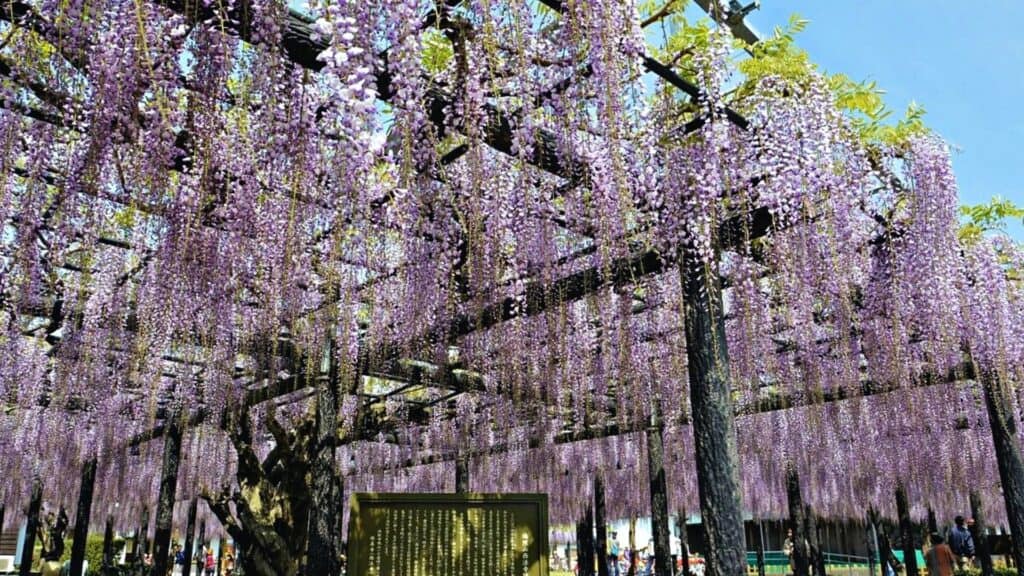
Inside Nagafuji Park, you can find Gyokoji Temple. There is a nationally designated natural monument here, Kumano Nagafuji, which is estimated to be about 850 years old. Besides this unique wisteria tree, there are five designated trees of the prefecture’s natural monument and dozens of wisteria. Besides these, a wisteria shelf with a total area of 1,042 square meters spreads out in the adjacent Toyota Kumano Memorial Park, and you can enjoy flower viewing in all of these places.
Best time to see: Late April-early May
Access: About 10 minutes by taxi from Toyodacho Station
14. Takehana Betsuin (Gifu)
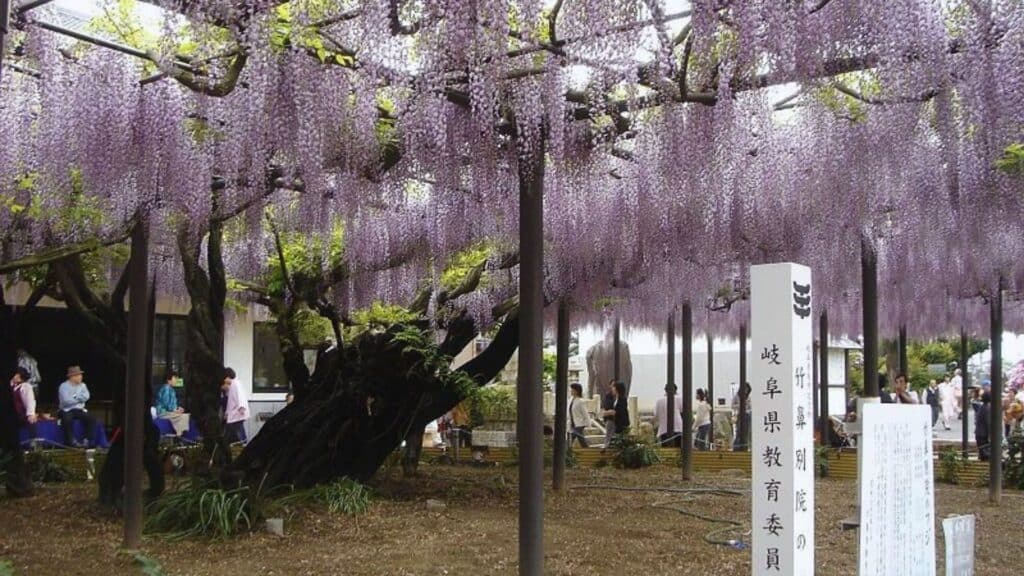
Inside Nagafuji Park, you’ll discover Gyokoji Temple, home to the Kumano Nagafuji wisteria, a nationally designated natural monument estimated to be about 850 years old. In addition to this unique wisteria tree, the park features five other trees recognised as natural monuments of the prefecture and numerous wisteria plants. Adjacent to this, Toyota Kumano Memorial Park boasts a wisteria shelf covering a total area of 1,042 square metres. Visitors can enjoy flower viewing across all these sites, experiencing the historic and beautiful wisteria in Japan.
Best time to see: Late April to early May
Access: About 5 minutes on foot from Hashima City Hall Station
15. Byakugo-ji Temple (Hyogo)

Byakugo-ji Temple, believed to have been established by the Indian ascetic Hodo Sennin in 705, showcases the spectacular wisteria in Japan. In May, the Kyushaku wisteria in the area reaches full bloom, with a wisteria shelf extending approximately 120 metres in a magnificent display of colour. The flower clusters, ranging from 1.2 to 1.5 metres in length, hang down in a shower-like formation. This view is spectacular, especially at night when the beautiful wisteria is illuminated, creating a unique and gorgeous scene distinct from the daytime experience.
Best time to see: Early to mid-May
Access: About 10 minutes by taxi from Ichijima Station
16. Dasai Shrine (Hyogo)
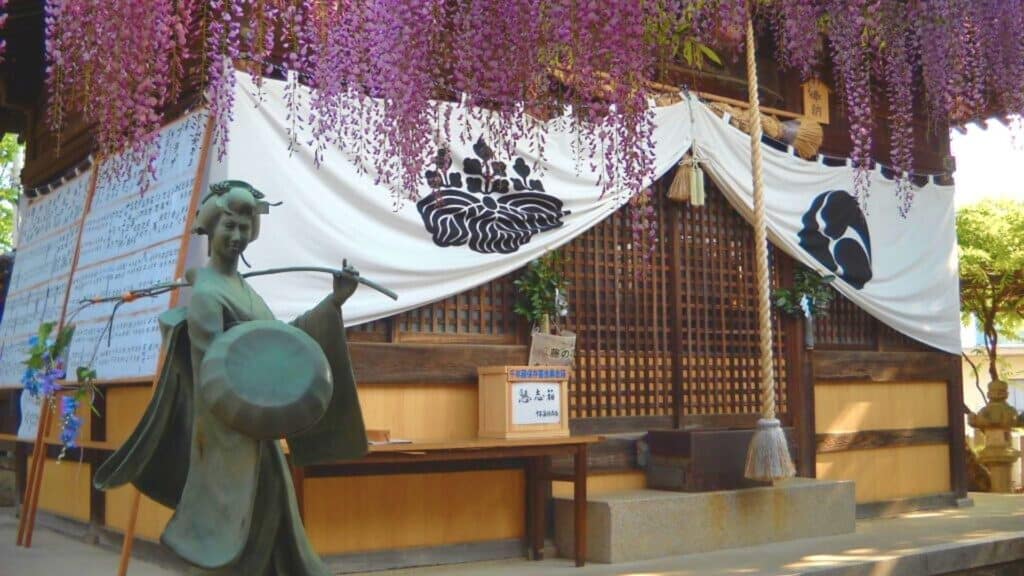
The wisteria at Dasai Shrine, reputedly planted by the local Yoemon in 960, is over 1,000 years old. This venerable tree features a large trunk approximately 3.8 meters in circumference, with flower clusters about 1 meter long blooming on a wisteria trellis covering around 420 square meters. Recognized as a natural monument by Hyogo Prefecture, it has also been selected as one of the “100 Fragrant Landscapes” by the Ministry of the Environment. Visitors can enjoy a leisurely stroll in the area, surrounded by the sweet scent of wisteria, and experience a piece of history through the ancient wisteria in Japan.
Best time to see: Late April to mid-May
Access: About 5 minutes by car from Yamasaki IC
17. Shirai Omachi Fuji Park (Hyogo)

Shirai Omachi Fuji Park, established in 1999, is renowned for its extensive wisteria trellises, spanning about 500 meters in length and 4 meters in width, across an area of approximately 7,000 square meters. The park features white, purple, and pink wisteria flower clusters that can reach lengths of up to 1.45 meters. The sight of Fujinami (wisteria waves) swaying in the wind is truly magnificent. During peak bloom, numerous carp streamers are displayed over the reservoir on the north side of the park, creating a festive and beautiful atmosphere. Visitors can enjoy the stunning display of wisteria in Japan, complemented by the colorful carp streamers, making for a memorable experience.
Best time to see: Early to mid-May
Access: About 10 minutes by taxi from Wadayama Station
18. Kumano Shindachijuku (Osaka)
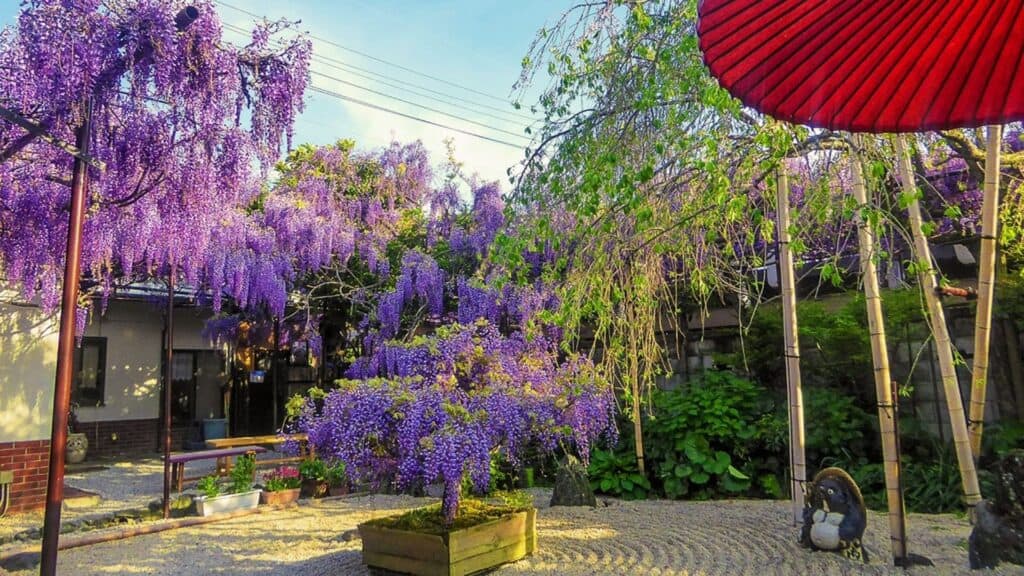
Shindachijuku showcases the Noda Fuji of the Kajimoto family along the Kumano Highway, where the old townscape is preserved. This impressive tree boasts approximately 40,000 flower clusters, and a wisteria festival is held when it is in full bloom. During this time, a viewing platform is installed, allowing visitors not only to gaze up at the wisteria from below but also to view the wisteria from above, creating a visual experience reminiscent of a sea of clouds. This event provides a unique opportunity to appreciate the historic and breathtaking wisteria in Japan.
Best time to see: Mid to late April
Access: About 8 minutes on foot from Izumi-Sunagawa Station
19. Kasuga Taisha Shrine / Manyo Botanical Garden (Nara)

Kasuga Taisha Shrine is celebrated for its abundant wisterias, with approximately 200 plants of 20 different varieties located in the south garden of the Manba Botanical Garden. During the early blooming period, visitors can admire rare types of wisteria, including the fragrant “Musk Fuji” and the deep pink “Showa Benifuji”. As the season progresses, from mid to late bloom, other varieties like Kuroryu Fuji start to flower, offering a diverse display of wisteria in Japan. This succession of blooms ensures a prolonged and varied spectacle of these enchanting flowers.
Best time to see: Late April-early May
Access: Bus from Nara Station (get off at Kasuga Taisha Omotesando stop)
20. Toba Water Environment Conservation Center (Kyoto)

Toba no Wisteria in Kyoto is a known spot for viewing wisteria, open to the public for just a few days each year. When the wisterias are in full bloom, various events take place, attracting visitors to this spectacular scene. The highlight is a corridor under the wisteria shelf, where purple, shower-like flower clusters extend for approximately 120 meters, creating a stunningly beautiful pathway. This makes it a sought-after location for those wishing to experience the splendor of wisteria in Japan.
Best time to see: Late April
Access: Get off at Kamitoba Umama stop on the city bus and walk for about 10 minutes
21. Jonangu (Kyoto)

Jonangu features five distinct gardens, each with its own unique character. The wisteria bloom is a highlight in the Muromachi Garden, designed in the style of the Muromachi period, complete with a pond. At the centre of the pond lies Horaijima, an island adorned with pine trees representing immortality and longevity. Visitors can also admire koi fish elegantly swimming in the pond. The garden is home to stunning wisteria and azalea plants, both around 150 years old, which stand beautifully side by side, offering a picturesque scene that captures the essence of traditional Japanese landscaping.
Best time to see: Late April
Access: About 15 minutes on foot from Takeda Station
22. Sandai Shrine (Shiga)

The “Sunazuri no Fuji” at Sandai Shrine along the Shina Highway hangs down nearly 2 meters, and the wisteria festival is held from late April to early May. Here, you can find the 2-metre-high hexagonal pillar stone lantern next to the main shrine, representative of stone art from the Kamakura period and designated as a national important cultural property. Along with the neighbouring Shina Shrine and Sosha Shrine, these three spots are well-known for their wisteria in Japan.
Best time to see: Late April to early May
Access: From Kusatsu Station, take the Ohmi Railway bus bound for Karasuma Peninsula, get off at Kitaogaya, and walk for about 10 minutes
23. Shohoji (Shiga)
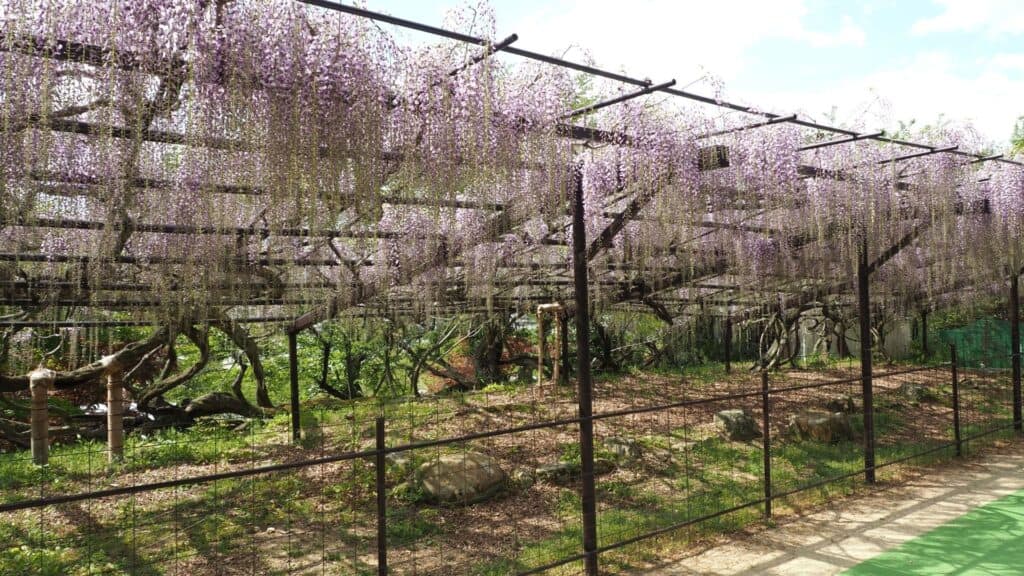
This landmark’s ancient wisteria tree, over 300 years old, is a renowned example of wisteria in Japan. In May, its flower clusters, extending more than 1 metre in length, hang down in a stunning display. Shohoji is a location where you can appreciate not only the wisteria but also the numerous cultural properties, such as the stone treasure tower and Basho’s monument, both of which are important cultural properties of Japan. Thus, Shohoji offers a unique opportunity to enjoy both the natural beauty and historical richness of the area.
Best time to see: Early to mid-May
Access: From Hino Station, take the Hino Municipal Bus bound for Kaigake, get off at the end station, and walk for about 10 minutes
24. Achi Shrine (Okayama)

Achi Shrine, over 1,700 years old, sits atop Mt. Tsurugata in the picturesque district of Kurashiki. The wisteria at Achi is designated as a natural monument in Okayama Prefecture, featuring a rare species known as Akebonofuji. The sight of pink flowers adorning the wisteria trellis is truly splendid. Additionally, during Golden Week, the wisteria festival draws large crowds to the shrine.
Best time to see: Late April to early May
Access: About 15 minutes on foot from Kurashiki Station
25. Juunji (Tottori)

Juunji Temple, also known as Fujiji Temple, proudly showcases four substantial wisteria trees of the renowned Rokushaku Fuji variety, a rarity among wisteria in Japan. These wisteria species display clusters of flowers cascading down to approximately 1.8 meters. During Golden Week, visitors can immerse themselves in a range of activities, such as savouring wisteria mochi gifts, enjoying koto performances, participating in tea ceremonies, and experiencing the enchanting light-ups at the wisteria festival.
Best time to see: Early to mid-May
Access: About 20 minutes on foot from Nawa Station
26. Teishoji (Ehime)

Teishoji Temple, believed to have been erected during the Kamakura period, is renowned for its ancient wisteria in Japan. The wisteria of Kannon-do, aged over 400 years, is esteemed as a natural monument of the prefecture. Standing at about 3 metres tall, its branches stretch approximately 16 metres from east to west and around 14 metres from north to south. When it reaches full bloom, a multitude of visitors, both local and from distant places, gather to marvel at its beauty.
Best time to see: Late April to early May
Access: About 10 minutes on foot from Iyo Saijo Station
27. Kawachi Wisteria (Fukouka)

From late April to mid-May, 22 varieties of wisteria flowers, including Noda Nagafuji and Lipstick Wisteria, grace the Kawachi Wisteria Garden in Japan. Among its scenic spots is the Ofuji shelf, spanning over 3,300 square meters, offering splendid views. As you wander through the enchanting wisteria tunnels, stretching approximately 110 and 80 meters, revel in the striking contrast between the lush greenery and the vibrant wisterias.
Best time to see: Early May
Access: About 20 minutes by car from Otani IC or Yamaji IC
28. Dainakatomi Shrine (Fukouka)
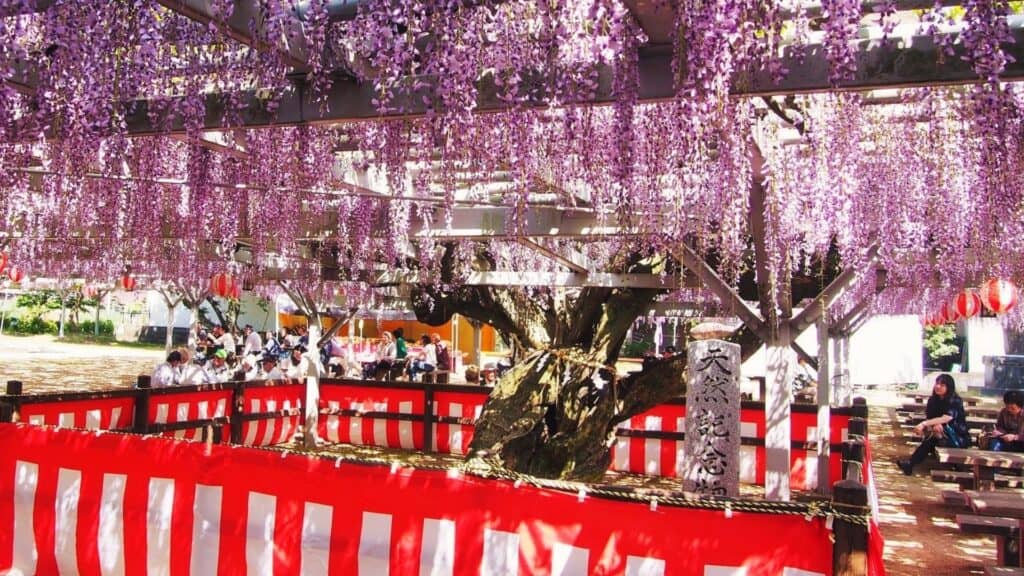
Shogun Fuji is reputedly dedicated by Prince Kaneyoshi, Emperor Go-Daigo’s son, around 600 years ago. The magnificent display of dark purple flowers blooming on a wisteria shelf spanning approximately 500 square meters is truly spectacular. At the Shogun Wisteria Festival, visitors can delight in the illuminated wisteria flowers, creating a magical atmosphere distinct from daytime.
Best time to see: Mid-April to early May
Access: About 5 minutes on foot from Hatama Station
What are your thoughts on these wisteria viewing spots in Japan? The country is renowned for its stunning wisteria gardens, offering visitors a breathtaking display of nature’s beauty.
From the vibrant hues of the Kawachi Wisteria Garden to the historical significance of Shogun Fuji, there’s a diverse range of wisteria experiences to explore. Additionally, Japan hosts numerous wisteria festivals throughout the spring season, attracting tourists and locals alike with their enchanting displays and cultural festivities. W
hether you’re drawn to the sprawling wisteria tunnels or the meticulously curated garden landscapes, each location offers a unique perspective on this beloved floral spectacle. With so many options to choose from, it’s an exciting opportunity to immerse yourself in Japan’s rich wisteria heritage and witness the country’s natural splendour in full bloom.
Find out more about Spring in Japan here: What to do in Spring, Where to go in spring, Wisteria in Japan, Spring Date ideas, What to do eat in spring, Where to see cherry blossom in Tokyo and Cherry blossom festivals.
Stay tuned for more information about Japan travel, Japanese culture, moving to Japan, living in Japan, Japanese language and more.


Recent Comments